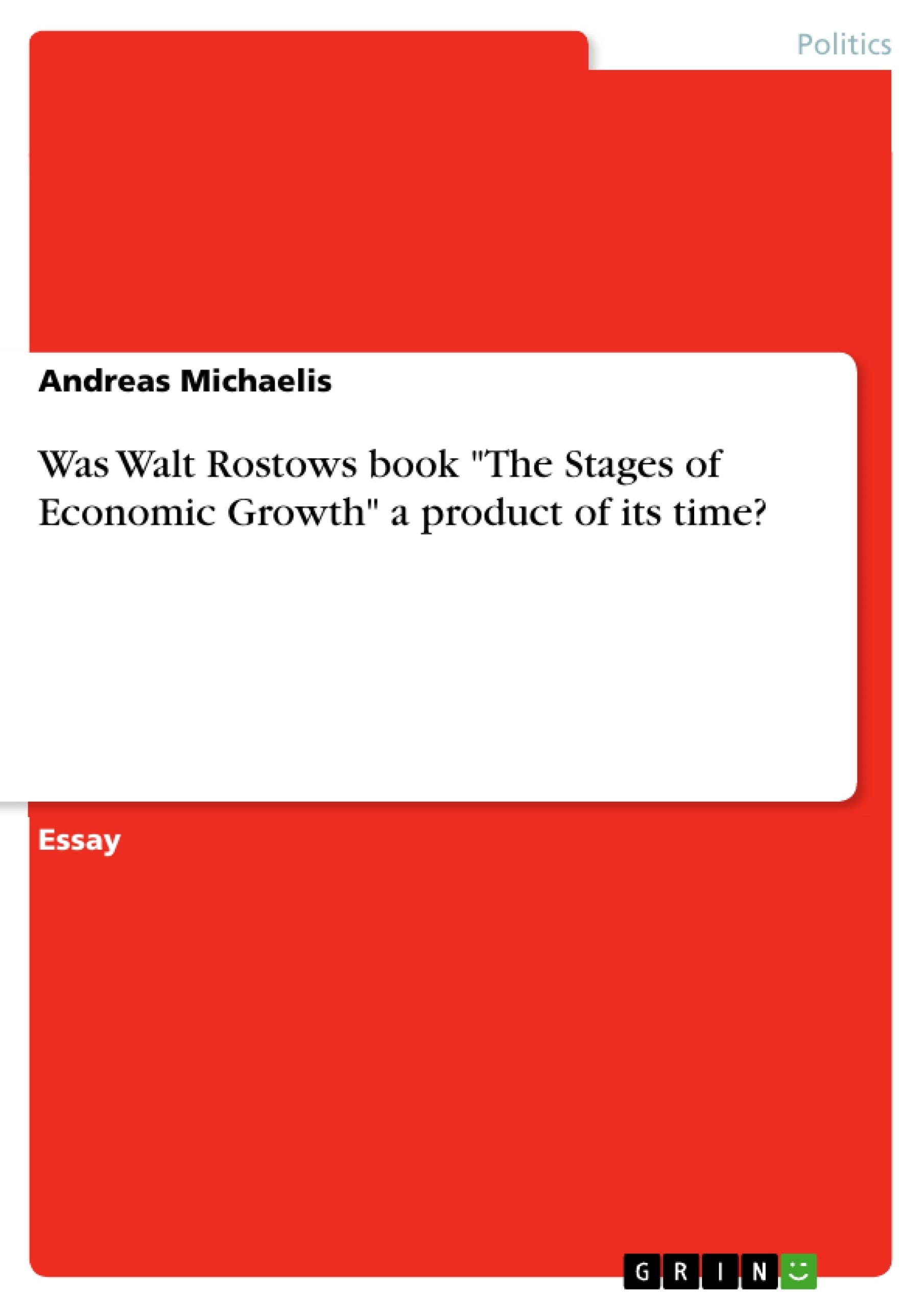This essay will focus on his work in the beginning of series of events that changed the perspective of development forever. I want to analyse the impact of the content of this time on the book of Rostow. I suggest that he was influenced by contemporary history of his time. First I want to explain Rostows idea of different stages of economic growth in the development process. Following I am going to define several contemporary events that could be influenced the work of Rostow, as well as the personal background of Rostow. I might suggest that the personal background as well as context of scientific debate influences an author and his work. Jim Marlow would call this "influence of intertextuality". Concluding I will summarize if my argument, that Rostows work was influenced by his time is valid or not.
Inhaltsverzeichnis (Table of Contents)
- I. Introduction
- II. Explaining modernization theory.
- III. The Stages of Economic Growth
- III.1. The traditional society
- III.2. The Preconditions for Take-Off Stage
- III.3. The Take-Off
- III.4. The Drive to Maturity
- III.5. The Age of High Mass-Consumption
- IV. Influence on his book
- IV.1. Historical-Scientific influence: economic thoughts of Keynesianism and Marxism
- IV.2. Historical-scientific stream: The Cold War and the end of imperialism
- IV.3. Historical- scientific stream: Realism of Hans Morgenthau (Politics among Nations, 1948)
- IV.4. Technical and methodological influence of his time
- V. Conclusion
- VI. Bibliography
Zielsetzung und Themenschwerpunkte (Objectives and Key Themes)
This essay analyzes Walt Rostow's book "The Stages of Economic Growth" and its connection to the historical context of its time. The main objective is to examine how the book was influenced by contemporary events, scientific debates, and Rostow's personal background. The essay aims to understand how these factors shaped Rostow's ideas about development and the stages of economic growth.
- Modernization theory and its significance in understanding the development process
- Rostow's framework for analyzing the stages of economic growth, from traditional societies to the age of high mass-consumption
- The influence of historical events, such as the Cold War and the rise of former colonies, on Rostow's work
- The impact of economic thought, specifically Keynesianism and Marxism, on Rostow's model of economic growth
- The role of scientific and technological advancements in shaping Rostow's ideas about development
Zusammenfassung der Kapitel (Chapter Summaries)
The introduction provides context for Rostow's work by highlighting the historical significance of the 1960s, particularly the emergence of newly independent nations. This period saw a surge in debates surrounding development and the causes of modernization. The essay introduces Rostow as a key figure in the modernization approach and outlines the essay's structure and objectives.
Chapter two explains modernization theory and its core concepts. It contrasts traditional societies with modern ones, emphasizing the role of scientific and technological knowledge in driving change. The chapter also explores the multifaceted nature of modernization and its potential for homogenization.
Chapter three delves into Rostow's "Stages of Economic Growth." It presents a framework for understanding societal development through five distinct stages: the traditional society, the preconditions for take-off, take-off, the drive to maturity, and the age of high mass-consumption. Each stage is described in detail, highlighting key characteristics and factors driving their development.
Chapter four examines the historical and intellectual influences on Rostow's work. It analyzes the impact of economic theories like Keynesianism and Marxism, as well as the geopolitical context of the Cold War. Additionally, it considers the influence of Hans Morgenthau's realist approach to international relations.
Schlüsselwörter (Keywords)
This essay focuses on key themes and concepts such as modernization theory, economic growth, development stages, the Cold War, Keynesianism, Marxism, and realism. These terms encompass the main areas of study, exploring the historical and intellectual context of Rostow's work and the influences that shaped his model of economic growth.
Frequently Asked Questions
What are the five stages of economic growth according to Walt Rostow?
The stages are: 1. The traditional society, 2. Preconditions for take-off, 3. The take-off, 4. The drive to maturity, and 5. The age of high mass-consumption.
How did the Cold War influence Rostow's work?
Rostow's book was written as a "non-communist manifesto." It aimed to provide an alternative to Marxist theory by showing that capitalism could lead to sustainable development and prosperity.
What is modernization theory?
It is a theory that explains the process of a society moving from a traditional state to a modern one, driven by scientific knowledge, technology, and industrialization.
Why is the "Take-Off" stage so important?
The take-off is a short period of intensive growth where new industries expand rapidly and the economy undergoes a structural transformation, leading to self-sustaining growth.
Did Rostow's personal background affect his theories?
Yes, the essay suggests that an author's personal background and the scientific debates of their time (intertextuality) significantly shape their work and perspectives.
- Quote paper
- Andreas Michaelis (Author), 2014, Was Walt Rostows book "The Stages of Economic Growth" a product of its time?, Munich, GRIN Verlag, https://www.grin.com/document/471608



